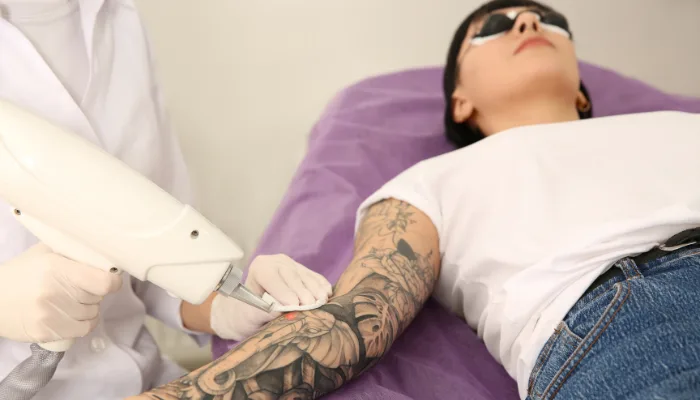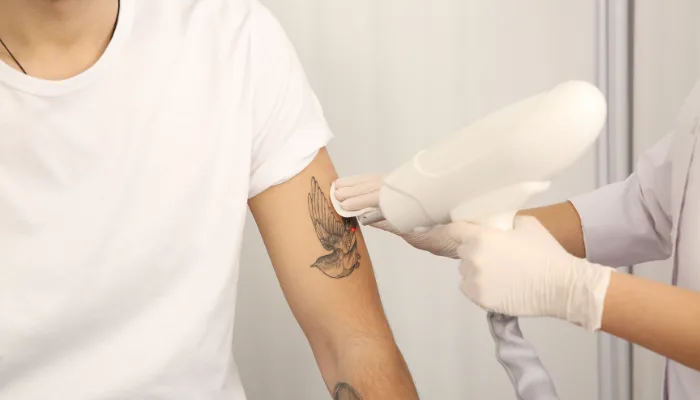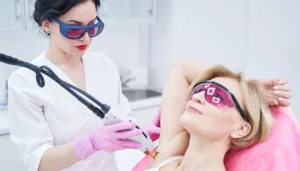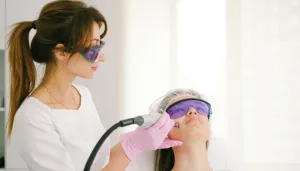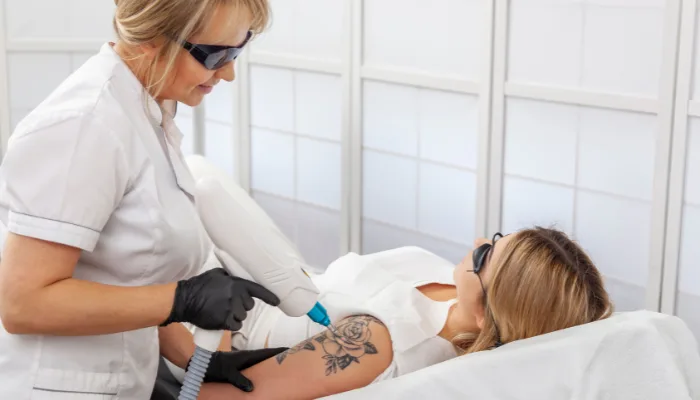
Laser tattoo removal is blowing up—and so is the demand for trained professionals who know how to do it right. Maybe you’re in the beauty industry and want to level up. Maybe you’re just tired of the 9–5 and dreaming of something new. The big question is: can you actually enroll in a laser tattoo removal course?
The answer might surprise you. In this post, we’re breaking down exactly who can take these courses, what kind of background you need (or don’t need), and how to take your first step into this fast-growing field.
If you’re thinking, “Could this be for me?”—stick around. You might be closer than you think.
Key Takeaways
-
Laser tattoo removal courses are open to various backgrounds, but specific qualifications may be required.
-
Practical training is a key component of these courses, ensuring students gain hands-on experience.
-
Individuals interested in changing careers, as well as those already in beauty professions, can benefit from enrolling.
-
Essential skills include technical proficiency with laser equipment and strong client communication abilities.
-
Regulatory requirements like licencing and insurance are crucial for anyone wishing to practise in this field.
Understanding Laser Tattoo Removal Courses
Laser tattoo removal course is a growing field, and there’s definitely demand for skilled technicians. Let’s break down what these courses usually involve.
Overview of Course Content
What’s actually in these courses? Well, expect a mix of theory and practical stuff. You’ll learn about the science behind laser technology, how different lasers work, and the different types of skin and tattoos you’ll be dealing with.
A big part of it is understanding how lasers interact with skin pigment and how to safely break down the tattoo ink without damaging the surrounding tissue. You’ll also cover things like client consultation, aftercare, and managing expectations. It’s not just zapping tattoos; it’s about understanding the whole process.
Importance of Practical Training
Honestly, the theory is important, but the practical training is where you really learn. You’ll get hands-on experience with laser equipment, working on different skin types and tattoo colours.
This is where you learn how to adjust the laser settings, how to position the handpiece, and how to monitor the skin’s reaction. It’s also a chance to practise your client communication skills and build your confidence. Trust me, you don’t want your first time using a laser to be on a real client!
Expected Outcomes for Graduates
So, what can you expect to be able to do after finishing a laser tattoo removal course? Ideally, you’ll be confident in your ability to safely and effectively remove tattoos using laser technology.
You should understand the different types of lasers, how to assess a client’s suitability for treatment, and how to manage any potential complications. You’ll also have a good understanding of the regulations and safety standards that apply to laser tattoo removal. Basically, you’ll be ready to start your career as a qualified laser tattoo removal technician.
It’s worth remembering that not all courses are created equal. Do your research, check the course content, and make sure it includes plenty of practical training. Look for courses that are accredited by reputable organisations, and don’t be afraid to ask questions before you sign up.
Eligibility Criteria for Enrolment
Before you jump in, let’s have a look at what you’ll need to actually get onto a course. Entry requirements can vary a bit depending on the training provider and the specific course, but there are some common things to keep in mind.
Minimum Age Requirements
Generally, you’ll need to be at least 18 years old to enrol in laser courses. This is because the use of laser equipment requires a certain level of maturity and responsibility. It’s also a legal requirement in many places.
Some training providers might have a slightly higher age limit, so it’s always worth checking the specifics of the course you’re interested in.
Necessary Educational Background
What about education? Well, you don’t always need a degree to get started. However, a good grasp of basic science, particularly biology, is really helpful. Some courses might ask for a Level 3 or Level 4 qualification (like A-levels or equivalent) in a related field, but others might not have any formal educational requirements.
It really depends on the course level and what the training provider thinks is important.
Relevant Work Experience
Do you need to have worked in beauty or healthcare before? Not always, but it can definitely be an advantage.
If you’ve got experience dealing with clients, understanding skin types, or even just working in a regulated environment, you’ll probably find it easier to pick things up. But don’t worry if you’re coming from a completely different background – plenty of courses are designed for complete beginners.
It’s worth remembering that even if a course doesn’t have strict entry requirements, having some relevant skills or knowledge can make the learning process smoother and help you get the most out of your training. Think about what you can bring to the table, and how you can build on that during the course.
Who Should Consider Enrolling?
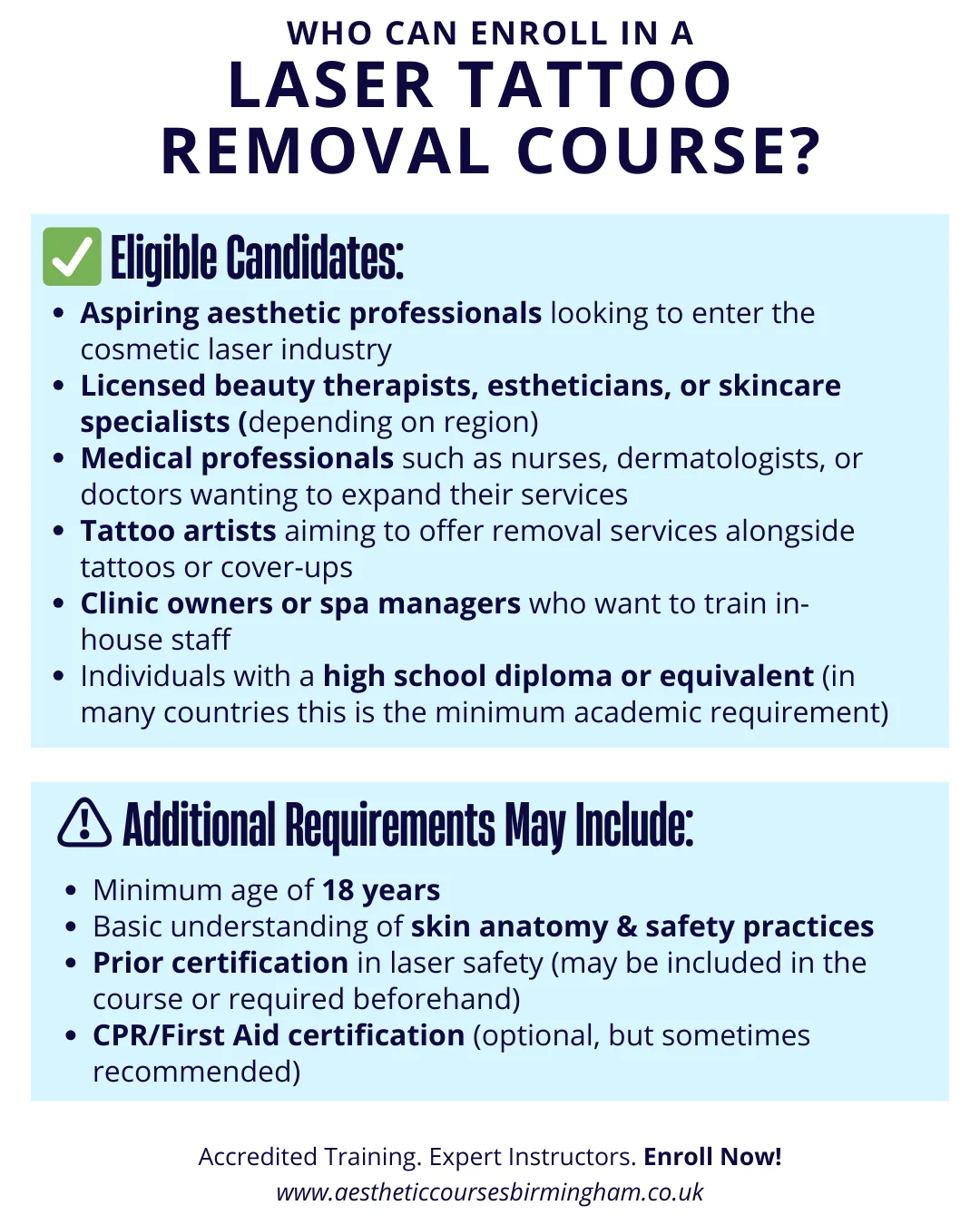
Laser tattoo removal courses aren’t just for anyone; they’re tailored for specific individuals looking to expand their skill set or change career paths. If you fall into any of the categories below, this might just be the perfect course for you.
Aspiring Tattoo Removal Technicians
If you’re dreaming of a career focused solely on tattoo removal, these courses are a fantastic starting point. You’ll gain the knowledge and practical skills needed to safely and effectively remove unwanted tattoos.
It’s a growing field, and skilled technicians are in demand. You’ll learn about different laser technologies, skin types, and aftercare procedures, setting you up for a successful career.
Current Beauty Professionals
Are you already working as a beautician, aesthetician, or in a related field? Adding laser tattoo removal to your list of services can significantly boost your income and attract a wider range of clients.
It’s a natural extension of many beauty treatments, and clients often prefer to go to someone they already trust for other procedures. Plus, it keeps your skills current and competitive.
Individuals Seeking Career Change
Feeling stuck in your current job? Laser tattoo removal courses offer a viable path to a new and exciting career. It’s a hands-on profession that’s both challenging and rewarding.
The beauty of this field is that it doesn’t necessarily require years of prior experience. With the right training and dedication, you can quickly become a skilled technician and start making a real difference in people’s lives.
Here’s why it might be a good fit:
-
Relatively short training period compared to other careers.
-
Good earning potential.
-
Opportunity to work independently or in a clinic setting.
-
Constantly evolving technology keeps the job interesting.
Essential Skills for Success
What does it really take to succeed in this field? It’s not just about knowing which button to press. Let’s break down the key skills you’ll need.
Technical Proficiency with Laser Equipment
Okay, this one’s pretty obvious, but it goes beyond just knowing the names of the parts. You need to be comfortable and confident operating different types of laser equipment.
-
This means understanding how the settings affect the treatment.
-
How to maintain the equipment.
-
How to troubleshoot common problems.
It’s like learning to drive – you need to know more than just where the pedals are.
Client Communication Skills
Think of it this way: you’re not just removing tattoos; you’re managing expectations and building trust.
-
Can you explain the procedure clearly?
-
Can you answer questions patiently and honestly?
-
Can you handle a nervous client?
Good communication is vital for client satisfaction and repeat business.
Here are some key communication skills:
-
Active listening
-
Empathy
-
Clear and concise explanations
-
Managing expectations
Attention to Detail and Safety Awareness
Laser tattoo removal isn’t something you can rush. It requires a keen eye for detail and a commitment to safety. You need to assess the tattoo carefully, choose the right settings, and monitor the client’s skin throughout the procedure. One slip-up could lead to burns or scarring, and nobody wants that. Always remember:
Safety should be your number one priority. Always follow protocols and never cut corners.
Regulatory Requirements for Practitioners
Before you start wielding that laser, it’s really important to get your head around the rules and regulations. It’s not just about knowing how to use the equipment; it’s about keeping yourself and your clients safe and sound.
Let’s break down what you need to know.
Licencing and Certification
Okay, first things first: licencing. To legally offer laser tattoo removal, you’ll almost certainly need a special treatment licence. The exact requirements can vary depending on where you are in the UK, so your local council is the place to check.
They’re the ones who issue the licences, and they’re also the ones who’ll come down hard on you if you’re operating without one. Also, having a recognised certification, like a Level 4 qualification, is often a prerequisite for getting insured, which is the next thing we’ll talk about.
Insurance Considerations
Right, insurance. It might seem like a boring topic, but trust me, it’s vital. Imagine something goes wrong during a treatment – and let’s face it, things can go wrong, even with the best training.
Without insurance, you could be facing some seriously hefty legal fees and fines. Here are a few types of insurance you might need:
-
Public Liability Insurance: Covers you if a client is injured on your premises.
-
Professional Indemnity Insurance: Protects you against claims of negligence or malpractice.
-
Treatment Liability Insurance: Specifically covers you for any adverse reactions or complications arising from the laser tattoo removal treatment itself.
Getting the right insurance isn’t just about protecting your business; it’s about protecting your clients. It shows that you’re a responsible practitioner who takes their safety seriously.
Health and Safety Regulations
Last but definitely not least, health and safety. Working with lasers involves potential risks, so you need to be clued up on all the relevant regulations. This includes things like:
-
Using appropriate personal protective equipment (PPE) – that’s eye protection for both you and the client, and maybe even a mask to protect against fumes.
-
Ensuring your laser equipment is properly maintained and serviced.
-
Having a designated laser safety officer (LSO) – this might be you, but you’ll need to have the right training.
-
Following strict hygiene protocols to prevent infection.
It might sound like a lot to take in, but honestly, it’s all about being prepared and doing things the right way. By getting the right licencing, insurance, and health and safety measures in place, you’ll be setting yourself up for a long and successful career in laser tattoo removal. Good luck!
Course Duration and Structure
So, you’re thinking about signing up for a laser tattoo removal course? Great! One of the first things people ask is, “How long will this take?” and “What’s the course actually like?”. Let’s break it down.
Typical Course Length
Course lengths can really vary. Some courses are super intensive, lasting just a few days, while others are spread out over several weeks or even months. It really depends on the depth of the material covered and the teaching style.
A shorter course might suit someone who already has a background in beauty therapy, while a longer one is often better for complete beginners. Generally, you can expect a comprehensive course to run for at least a few weeks to ensure you get enough hands-on experience.
Flexible Learning Options
These days, there are loads of ways to learn. You’ve got your traditional classroom-based courses, but there are also online options and blended learning approaches (a mix of online and in-person).
Online courses are great if you need to fit your studies around other commitments. Blended learning can give you the best of both worlds: the flexibility of online learning with the practical experience of being in a classroom.
Think about what works best for your learning style and your schedule. Do you learn better in a structured environment, or are you happy to work through materials at your own pace?
Assessment and Certification Process
Okay, so you’ve done the learning, now it’s time to prove you know your stuff. Assessment methods can include written exams, practical assessments (where you demonstrate your skills on live models), and portfolio work.
Here’s a rough idea of what assessment might look like:
-
Online theory tests (multiple choice)
-
Observations and oral questioning
-
Practical assessments and assignments
-
Portfolio evidence
Once you’ve passed all the assessments, you’ll get your certification. This is your ticket to start practising laser tattoo removal, so make sure the course you choose offers a recognised and reputable certification.
Career Opportunities Post-Certification
So, you’ve put in the work, aced the course, and you’re officially certified in laser tattoo removal. What’s next? Loads of options, actually! It’s not just about zapping unwanted ink; it’s about opening doors to a growing industry. Let’s have a look at what could be waiting for you.
Job Roles Available
Okay, first things first: what jobs can you actually get with this qualification? Well, the most obvious one is a Laser Tattoo Removal Technician. You could be working in a specialist clinic, a beauty salon that offers laser treatments, or even a dermatology practise.
But it doesn’t stop there. Some people go on to become clinic managers, overseeing the day-to-day running of a facility. Others might move into training, teaching the next generation of technicians. And if you’re feeling entrepreneurial…
Potential Earnings
Let’s talk money. Obviously, earnings can vary quite a bit depending on where you’re based, who you work for, and how much experience you’ve got under your belt. But, generally speaking, a qualified laser tattoo removal technician can earn a decent wage.
Starting salaries might be modest, but with experience and a good reputation, you can significantly increase your earning potential. Some technicians even operate on a commission basis, meaning the more clients they treat, the more they earn. It’s worth doing your research in your local area to get a realistic idea of what you can expect.
Industry Growth and Demand
Here’s the exciting bit: the tattoo removal industry is booming! More and more people are regretting their ink these days, and laser removal is the safest, most effective way to get rid of it. This means the demand for qualified technicians is only going to increase.
This is especially true as laser technology advances and becomes more accessible. Plus, with the rise of social media, people are more conscious of their appearance than ever before, which is driving demand for all sorts of aesthetic treatments, including tattoo removal. So, if you’re looking for a career with good prospects, this could be it.
Getting certified in laser tattoo removal isn’t just about learning a skill; it’s about investing in your future. The industry is growing, the earning potential is good, and there are plenty of opportunities to develop your career. So, go for it!
Conclusion
If you’re considering enrolling in a laser tattoo removal course, know that there are plenty of options available for you. Whether you’re a complete beginner or an experienced practitioner looking to refine your skills, there’s a course that fits your needs.
The qualifications required are straightforward, and with the right training, you can start a rewarding career in this growing field. Don’t hesitate to reach out to qualified course providers for more information. They can guide you through the process and help you make an informed decision. Remember, taking this step could lead to a fulfilling career helping others regain their confidence.
Frequently Asked Questions
Who can take laser tattoo removal courses?
Anyone interested in becoming a tattoo removal technician can enrol in these courses. This includes those new to the field, as well as current beauty professionals looking to expand their skills.
What qualifications do I need to enrol?
Typically, you should have a Level 3 qualification in Anatomy and Physiology. Some courses may also require a Level 4 certificate in laser treatments.
How long do the courses usually last?
The duration of laser tattoo removal courses can vary but generally ranges from a few days to several weeks, depending on the programme.
Is there a high demand for tattoo removal services?
Yes, there is a growing demand for tattoo removal services as more people seek to remove or alter their tattoos.
Do I need a licence to perform tattoo removals?
Yes, you will need a special treatment licence to legally perform tattoo removals, along with appropriate insurance.
What skills are important for success in this field?
Key skills include technical ability with laser equipment, good communication with clients, and a strong focus on safety and detail.

